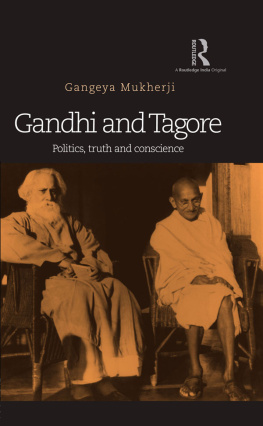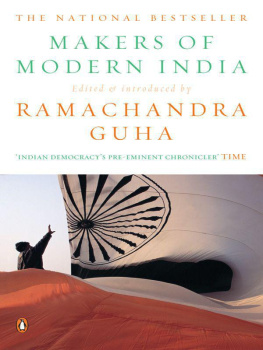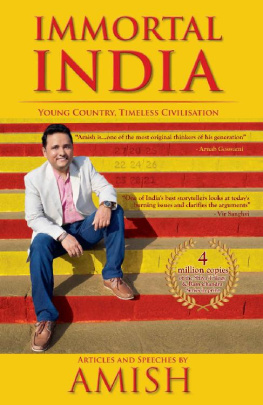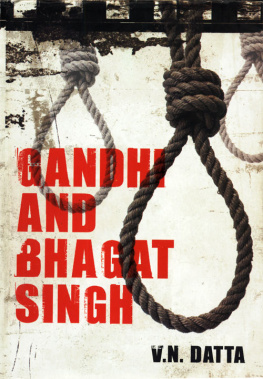
By the same author
Awadh in Revolt, 1857-58: A Study of Popular Resistance
Spectre of Violence: The 1857 Kanpur Massacres
Mangal Pandey: Brave Martyr or Accidental Hero?
The Penguin Gandhi Reader (editor)
India: Then and Now (co-author)
Trade and Politics in the Indian Ocean World: Essays in Honour
of Ashin Das Gupta (co-editor)


RANDOM HOUSE INDIA
Published by Random House India in 2011
Introduction and introductory notes Rudrangshu Mukherjee 2007
Introductory notes to speeches by Mani Shankar Aiyar,
Andr Bteille, Somnath Chatterjee, Khan Abdul Gaffar Khan
and Aruna Roy Rudrangshu Mukherjee 2011
Random House Publishers India Private Limited
Windsor IT Park, 7th Floor, Tower-B,
A-1, Sector-125, Noida-201301, U.P.
Random House Group Limited
20 Vauxhall Bridge Road
London SW1V 2SA
United Kingdom
This eBook is copyright material and must not be copied, reproduced, transferred, distributed, leased, licensed or publicly performed or used in any way except as specifically permitted in writing by the publishers, as allowed under the terms and conditions under which it was purchased or as strictly permitted by applicable copyright law. Any unauthorised distribution or use of this text may be a direct infringement of the authors and publishers rights and those responsible may be liable in law accordingly.
EPUB ISBN 9788184002348
For
Shobita
To talk and laugh, and to do each other kindnesses; to read pleasant books together; to pass from lightest jesting to talk of deepest things and back again: to differ without rancour, to teach each other and to learn from each other; these proceeding from our hearts as we gave affection and received it back, and shown by face, by voice, by the eyes, and by a thousand other pleasing ways, kindled a flame.
Contents
Part One
1880s1947
The opening of the Indian National Congress (1885)
WOMESH CHANDRA BONERJEE |
One country, two nations (1888)
SYED AHMED KHAN |
On the inauguration of the Muslim League (1906)
MUSHTAQ HUSSAIN |
On conserving ancient monuments (1900)
LORD CURZON |
Game preservation in India (1901)
LORD CURZON |
Sisters and brothers of America (1893)
SWAMI VIVEKANANDA |
How and why I adopted the Hindu religion (1902)
SISTER NIVEDITA (18671911) |
At Benares Hindu University (1916)
MOHANDAS KARAMCHAND GANDHI |
Freedom is my birthright (1917)
BAL GANGADHAR TILAK |
The trial speech (1922)
MOHANDAS KARAMCHAND GANDHI |
The dangerous cult of absolute non-violence (1940)
V.D. SAVARKAR |
Purna Swaraj (1929)
JAWAHARLAL NEHRU |
At the second Round Table Conference (1931)
MOHANDAS KARAMCHAND GANDHI |
The Muslims of India (1930)
MUHAMMAD IQBAL |
The death of God (1933)
M. SINGARAVELU |
Crisis of civilization (1941)
RABINDRANATH TAGORE |
Give me blood and I promise you freedom! (1944)
SUBHAS CHANDRA BOSE |
The great Calcutta killings (1946)
SHYAMAPROSAD MOOKERJEA |
Opening address to the Constituent Assembly of Pakistan (1947)
MUHAMMAD ALI JINNAH |
The dawn of freedom (1947)
SARVEPALLI RADHAKRISHNAN |
Tryst with destiny (1947)
JAWAHARLAL NEHRU |
Part Two
19472007
The light has gone out (1948)
JAWAHARLAL NEHRU |
My father, do not rest (1948)
SAROJINI NAIDU |
Why I killed Gandhi (1949)
NATHURAM GODSE |
Closing speech of the first Constituent Assembly of India (1949)
B.R. AMBEDKAR |
Temples of the new age (1954)
JAWAHARLAL NEHRU |
Power (Calcutta, November 1954)
S.N. BOSE |
On the Five-Year Plans (1955)
JAWAHARLAL NEHRU |
The Hindu Code Bill (1955)
J.B. KRIPALANI |
The Kashmir issue (1952)
SHYAMAPROSAD MOOKERJEA |
Tibet (1959)
ATAL BIHARI VAJPAYEE |
A myth (1968)
J.R.D. TATA |
The presidential system (1968)
J.R.D. TATA |
Importance of NGOs (1969)
JAYAPRAKASH NARAYAN |
I have come to serve you (1969)
KHAN ABDUL GHAFFAR KHAN |
Tragedy in Bangladesh (1971)
INDIRA GANDHI |
Proclamation of Emergency (1975)
INDIRA GANDHI |
Speech in the Lok Sabha on the Presidents address (1976)
SOMNATH CHATTERJEE |
The education of a filmmaker (1982)
SATYAJIT RAY |
Lowering the voting age to eighteen (1988)
RAJIV GANDHI |
Panchayati raj (1989)
RAJIV GANDHI |
Present economic situation (1991)
MANMOHAN SINGH |
The future of Indo-US relations (1994)
P.V. NARASIMHA RAO |
Why Ayodhya is a setback (1992)
L.K. ADVANI |
The fatwa (1993)
SALMAN RUSHDIE |
Survival and Right to Information (1996)
ARUNA ROY |
On Founders Day (1992)
VIKRAM SETH |
Doon School Founders Day address (2007)
MANI SHANKAR AIYAR |
Our culture, their culture (1995)
AMARTYA SEN |
Renunciation (2004)
SONIA GANDHI |
On Jinnah (2005)
L.K. ADVANI |
In Lahore (1999)
ATAL BIHARI VAJPAYEE |
The viable university (2010)
ANDR BTEILLE |
Rekindling a spark of enthusiasm (1982)
J.R.D. TATA |
Preface to the Paperback Edition
The fact that this book is going in for a paperback edition is ample proof that people are interested in reading speeches. One reason for this is that the text of a speech helps to capture a slice of history even though the speech-making aspects are lost in the written word. For this edition, I have corrected a few errors that were brought to my notice. More importantly, I have added five more speeches to the original. Two out of the five that have been added are previously unpublished and I am deeply grateful to Aruna Roy and Mani Shankar Aiyar for allowing me to read these speeches and for the permission to print them.
October 2010 | Rudrangshu Mukherjee |
Introduction
For last years words belong to last years language
And next years words await another voice
Since our concern was speech, and speech impelled us
To purify the dialect of the tribe
And urge the mind to aftersight and foresight
T.S. Eliot, Little Gidding
Speeches are meant to be spokenand heard. For this reason, a speech is fundamentally different from other forms of written text, for it is not simply dependent on the words alonethough they are the vital components of a good speechbut on certain other skills to do with voice and even gesture. A good orator brings to a speech something more persuasive and moving than the power of the written word and these qualities often prove to be ephemeral, losing something of themselves in printed form. But there are certain speeches that retain their emotive charge. Think of Abraham Lincolns Gettysburg address and those wordsgovernment of the people, by the people and for the peoplewhich have become the most quoted definition of democracy. Or think of Winston Churchills memorable speeches during the Second World War. At the time they were made, Churchills speeches roused the British people and sustained their morale during their darkest hour. Even today, they make stirring reading and so many of the phrases and sentences that he used have become part of the English language. This book brings together some of the speeches made in India, from the end of the nineteenth century to the beginning of the twenty-first, which retain their power as written texts.
Next page



![Gandhi - Gandhi: [the true man behind modern India]](/uploads/posts/book/175484/thumbs/gandhi-gandhi-the-true-man-behind-modern-india.jpg)





